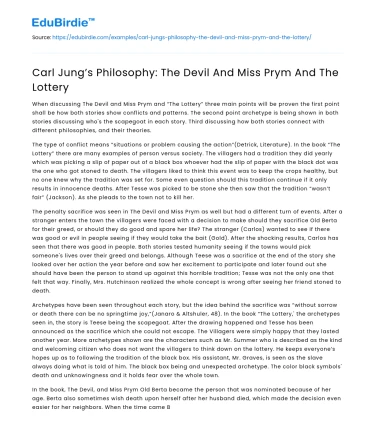When discussing The Devil and Miss Prym and “The Lottery” three main points will be proven the first point shall be how both stories show conflicts and patterns. The second point archetype is being shown in both stories discussing who's the scapegoat in each story. Third discussing how both stories connect with different philosophies, and their theories.
The type of conflict means “situations or problem causing the action”(Detrick, Literature). In the book “The Lottery” there are many examples of person versus society. The villagers had a tradition they did yearly which was picking a slip of paper out of a black box whoever had the slip of paper with the black dot was the one who got stoned to death. The villagers liked to think this event was to keep the crops healthy, but no one knew why the tradition was set for. Some even question should this tradition continue if it only results in innocence deaths. After Tesse was picked to be stone she then saw that the tradition “wasn’t fair” (Jackson). As she pleads to the town not to kill her.
Save your time!
We can take care of your essay
- Proper editing and formatting
- Free revision, title page, and bibliography
- Flexible prices and money-back guarantee
The penalty sacrifice was seen in The Devil and Miss Prym as well but had a different turn of events. After a stranger enters the town the villagers were faced with a decision to make should they sacrifice Old Berta for their greed, or should they do good and spare her life? The stranger (Carlos) wanted to see if there was good or evil in people seeing if they would take the bait (Gold). After the shocking results, Carlos has seen that there was good in people. Both stories tested humanity seeing if the towns would pick someone's lives over their greed and belongs. Although Teese was a sacrifice at the end of the story she looked over her action the year before and saw her excitement to participate and later found out she should have been the person to stand up against this horrible tradition; Tesse was not the only one that felt that way. Finally, Mrs. Hutchinson realized the whole concept is wrong after seeing her friend stoned to death.
Archetypes have been seen throughout each story, but the idea behind the sacrifice was “without sorrow or death there can be no springtime joy,”(Janaro & Altshuler, 48). In the book “The Lottery,' the archetypes seen in, the story is Teese being the scapegoat. After the drawing happened and Tesse has been announced as the sacrifice which she could not escape. The Villagers were simply happy that they lasted another year. More archetypes shown are the characters such as Mr. Summer who is described as the kind and welcoming citizen who does not want the villagers to think down on the lottery. He keeps everyone’s hopes up as to following the tradition of the black box. His assistant, Mr. Graves, is seen as the slave always doing what is told of him. The black box being and unexpected archetype. The color black symbols' death and unknowingness and it holds fear over the whole town.
In the book, The Devil, and Miss Prym Old Berta became the person that was nominated because of her age. Berta also sometimes wish death upon herself after her husband died, which made the decision even easier for her neighbors. When the time came Berta realized she did not want to die, and she began to love life and did not want to be the unanimous vote. Some might say Berta also symbolizes the mentor and the witch of the story. Another archetype seen is Chantal Prym who is the soul mate, and the beautiful barmaid who wants to leave the town, but in the end, she makes the right decision.
Carl Jung’s philosophy was “Apollonian: Analytic and Rational and Dionysian: Intuitive and Emotional”(Detrick, Philosophy). Therefore Carl Jung is one of many philosophers that holds an influence “Jung believed that the human psyche was composed of three components: the ego, the personal unconscious, and the collective unconscious”(Cherry, 2019). That's why Carl Jung saw many “universal symbols and patterns”(Biography). In both stories, the villagers played a big part in the behavior and patterns seen thought each story.
Archetypes seen with Carl Jung's theory would be Carlos being the trickster he stirs up the pot to get the villagers to give in to their temptations. Chantel Prym would a fine example of the maidan she is innocent she just wants to place other than the small village. The children in “The Lottery” will symbolize the child because the innocence they show though out the book. Mr. Summer is a fine example of a wise man, he convinces and forces the people to continue their yearly tradition, but he also symbolizes the trickster although he is seen as a good citizen is wicked ways make all the villagers follow him.
In both stories, it was interesting to connect the main points with two different endings and similar beginnings. The story I found more interesting was “The Lottery”; Although it had its similarities with The Devil and Miss Prym it had a tragic ending in “The Lottery”. It was surprising that the villagers choose to do evil instead of ending the tradition, and it was also surprising that Tesse kids turned and threw stones at her. The events were much clearer to see when forming my main points.






 Stuck on your essay?
Stuck on your essay?

